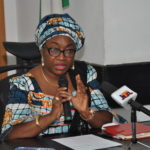AFRICA MUST INDUSTRIALISE, CEASE BEING DUMPING GROUND FOR INDUSTRIAL PRODUCTS – SANWO-OLU
Nov. 25, 2021
Lagos State Governor, Babajide Sanwo-Olu has expressed the need for Africa to industrialise and cease being a dumping site for industrial, commercial and consumer products from other countries.
Speaking at the Y2021 Africa Industrialisation Day, held in Alausa, Ikeja, Lagos, Sanwo-Olu said that industrialisation of Africa will serve a dual purpose of socio-economic empowerment, through job creation, and wealth generation opportunities for the people, while enhancing government revenue for government for provision of infrastructure and social services.
The Governor, who was represented by the Secretary to the State Government, Mrs. Folashade Jaji, declared that the State was not unmindful of the potentials available for socio-economic growth and regeneration, especially with its status as the hub of socio-economic and industrial activities in Nigeria and the ECOWAS sub-region.
His words: “We are committed to enhancing our potential through partnerships and collaboration with the private sector and other stakeholders, provision of incentives and implementation of policies that will encourage more entrepreneurs to jump on the industrialisation train.
“I urge you all, young and upcoming entrepreneurs in particular, to take advantage of the opportunities we have provided through relevant government agencies. Industrialisation is about adding value to the abundant primary products we are blessed with for greater and more rewarding returns, through local consumption and exports”, he said.
He further noted that the creation of the Africa Continental Free Trade Area (AFCFTA) has the potential of being a veritable platform for the opening up of the industrial space with available opportunities to promote free trade among component States.
In her opening remarks, Commissioner for Commerce, Industry and Cooperatives, Dr. Lola Akande, affirmed that the theme for this year; “Industrialising Africa: Renewed Commitment Towards an Inclusive and Sustainable Industrialisation and Economic Diversification”, is apt and timely.
Mrs. Akande said: “I wish to also remind you of the need to begin to work out strategies that would give our Country comparative advantages as a nation in view of the Africa Continental Free Trade Agreement which Nigeria keyed into on 22nd July, 2019 in Niamey”.
“It is expected that once AfCFTA is fully implemented, it will create a single African market for goods and services, covering an estimated 1.2 billion people with a combined GDP of USD2.5 trillion across 55 member States,” she stated.
She noted that the Sanwo-Olu government had introduced the exhibition of locally fabricated machines, equipment and innovative projects from schools in Lagos State to create the desired linkage between machine fabricators, manufacturers of products and the end-users.
The Commissioner enjoined all stakeholders to take advantage of this opportunity and make efforts to create a synergy that would lead to value addition on the government’s path to industrialisation, economic recovery and growth.
Also, the Special Adviser to the Governor on Commerce, Industry and Cooperatives, Mr. Oladele Ajayi asserted that the annual event is a good platform to showcase innovative potentials of students in local machine fabrication and made in Lagos products.
He declared that the event will assist young entrepreneurs and industrialists to grow their businesses and create linkages for sustainable development.
While commending the State Government’s effort in sustaining the annual event, Ajayi submitted that the Week has encouraged young industrialists to thrive, despite the socio-economic challenges, and also encouraged the patronage of locally made products.








